Tropical plants – 10 exotics that grow happily indoors
These are the best tropical indoor plants that thrive inside your home

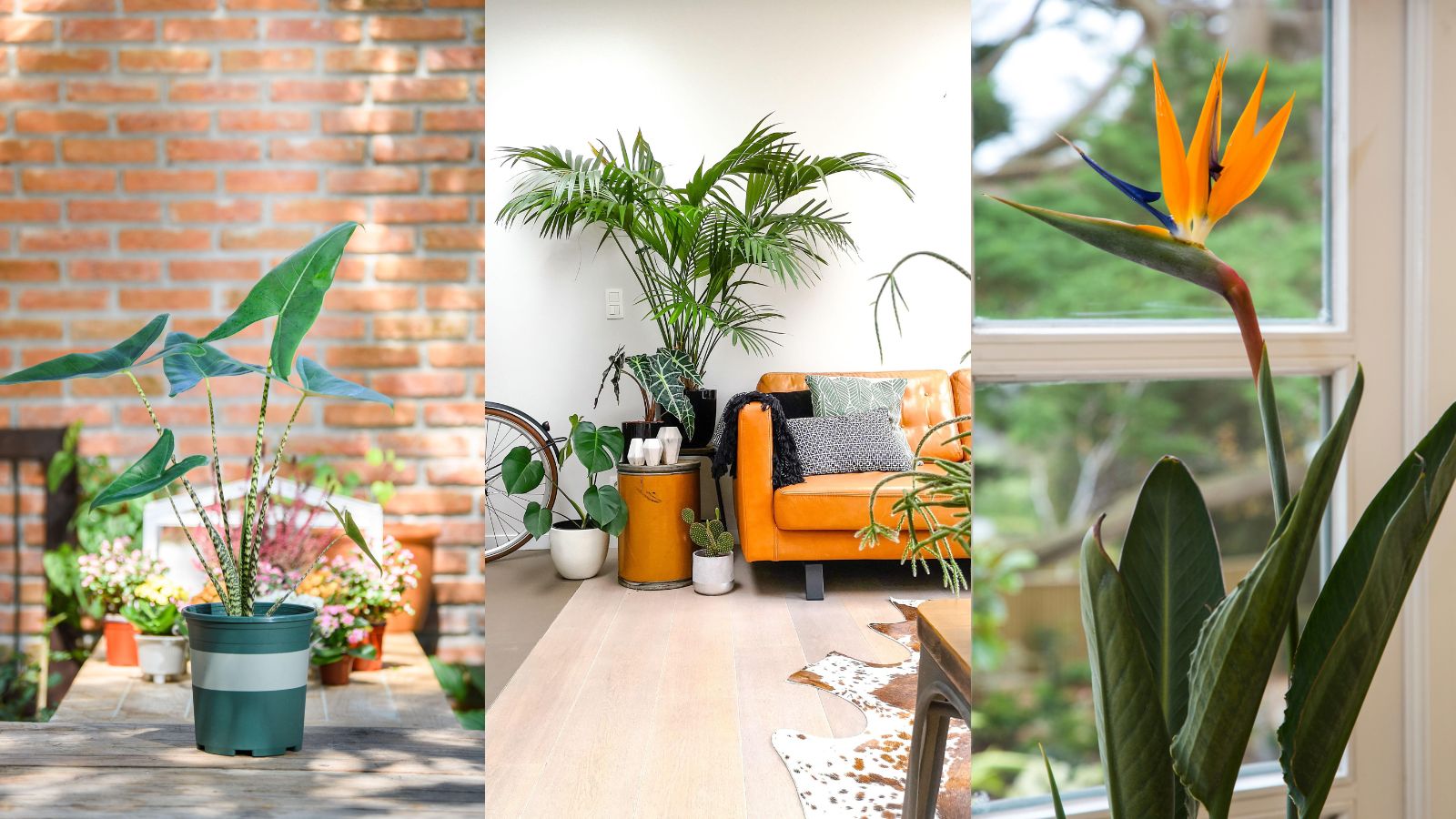
With large glossy foliage, architectural good looks and standout charm, these tropical plants will conjure up that lush, restful feel in any room, will enhance your décor, and boost your wellbeing too.
Surrounding yourself with greenery and reconnecting with nature has long been proven to ease stress and lower heart rates, so it’s no surprise that the sales of majestic indoor plants with diverse types of foliage have increased rapidly in the last few years.
However, choosing tropical plants is not just a matter of selecting on looks alone, as horticultural writer Veronica Peerless, author of How Not To Kill Your Houseplant explains: ‘There’s a horticultural saying of "Right plant, right place" and this certainly applies to houseplants as well as those in the garden. Be realistic when it comes to placing a plant indoors, consider its practical needs as well as your aesthetic ideal and be prepared to compromise.’
Keen to create an indoor jungle but unsure of where to start? Well, let our easy-to-follow guide to tropical plants, laden with expert tips, steer you to shop with confidence.
Tropical indoor plants
Love tropical garden ideas and want to mirror what you have outdoors inside? Easy to care for and difficult to kill, these are our top picks of tropical plants that grow indoors.
1. Swiss Cheese plant or Monstera
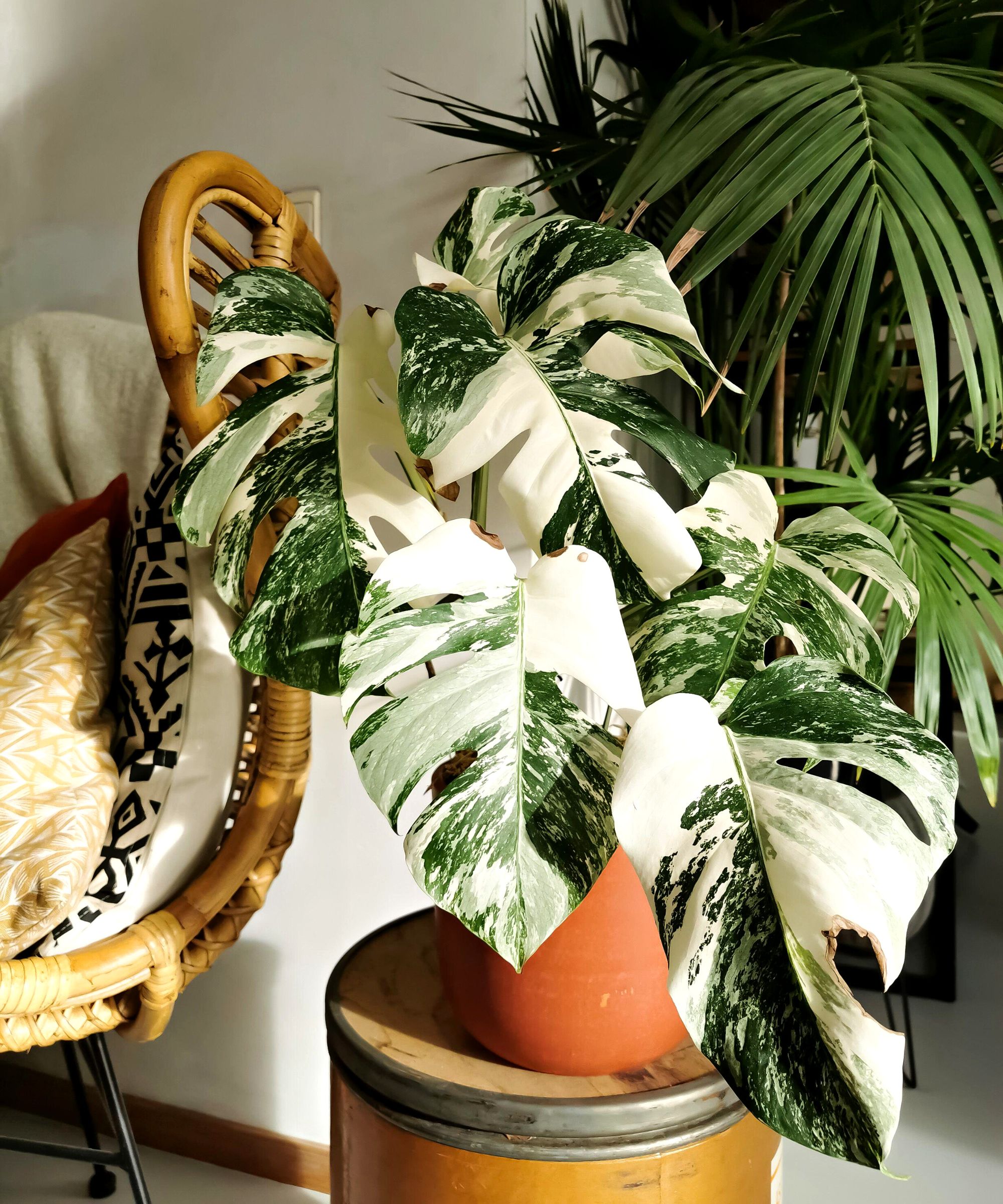
‘Monstera, also known as the Swiss Cheese Plant, are brilliant tropical houseplants with lush green and distinctive leaves,’ says Scott Perkins, Houseplant Buyer at Hillier Nurseries. ‘Originating from a natural jungle habitat, Monstera are luscious in form and are becoming increasingly popular thanks to their artistic appearance. As the Monstera matures, its leaves will split and develop holes, creating a graphic look suitable for any home.’
Simple to care for, these leafy giants are in fact climbers with aerial roots so do need to be trained up mossy poles to mimic the trees they cling to in the wild. They are easy to propagate too and will provide several smaller plants, that can be potted up separately, in a relatively short time. You can find out how to repot monstera in our dedicated guide. Preferring high humid conditions with bright, indirect light they thrive well in a steamy bathroom, kitchen or living area.
Design expertise in your inbox – from inspiring decorating ideas and beautiful celebrity homes to practical gardening advice and shopping round-ups.
2. The ric-rac plant or Zanzibar Gem
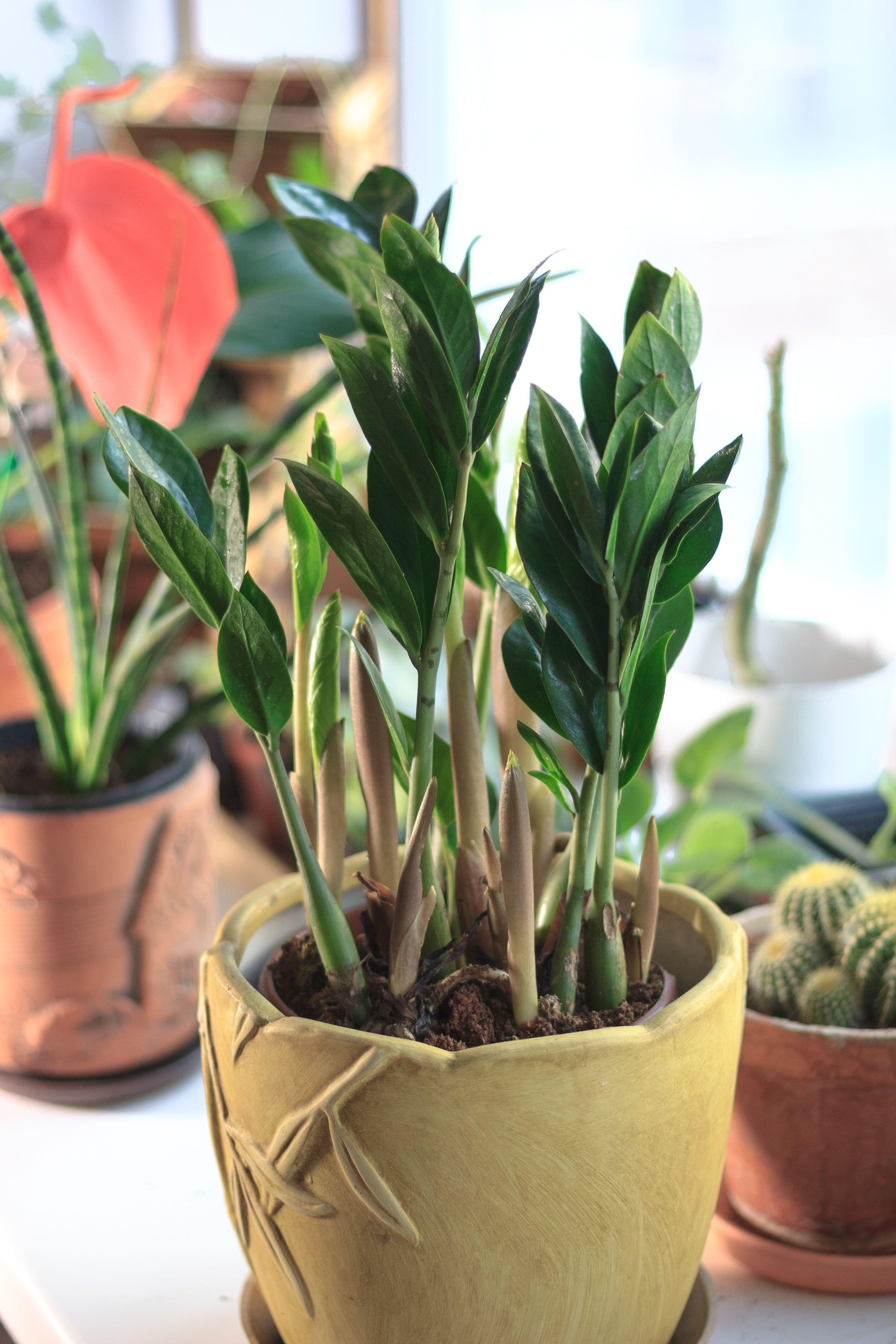
With its dark glossy slender leaves with distinct wavy edges, the ZZ plant or ric-rac plant is an indoor tropical must, and one of the best low maintenance indoor plants. Not only does it make a real impact placed on its own, but it really stands out in a leafy crowd, adding texture, interest and character.
A very undemanding plant, it will merrily thrive in a shady spot as well as indirect light and is happy to be root bound, reducing the need for regular repotting. Extremely drought tolerant and hard to kill, the tall foliage slowly grows up to 3ft (just under 3ft) high and prefers temperatures of 59-79°F (15°C to 24°C).
One extra bonus is that this striking plant has a very upright habit, making it perfect for smaller homes and living spaces. Give it an extra growth boost by feeding it with liquid fertilizer once per month in spring and summer.
3. Orchids
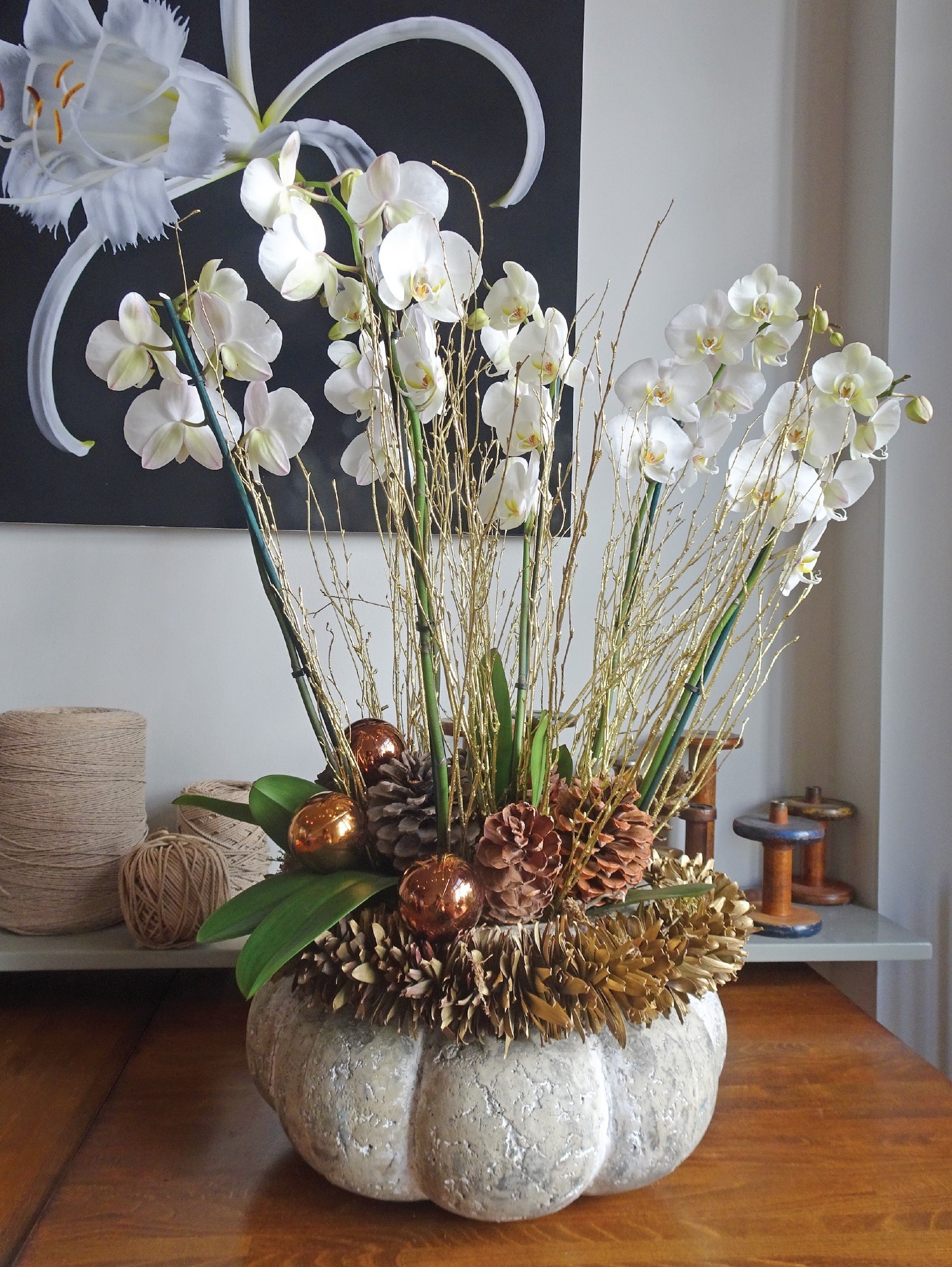
You can never get tired of the exotic charm of orchids. Elegant and intricate without being showy, there are so many different types to choose from.
‘Orchids are unusual and striking, low-maintenance houseplants that are available in a range of bright and exotic colors,’ says Scott Perkins, Houseplant Buyer at Hillier Nurseries. ‘The most popular orchids are Moth Orchids (Phalaenopsis), as they require very little upkeep to still look stunning. Like most varieties of orchid, the blooms are not only vibrant but also monosymmetric, meaning they mirror either half of the flower itself. Certain varieties will have intricate designs that give them a very unique appearance, creating a fantastic talking point and a brilliant choice of houseplant.’
Although orchid care may seem daunting at first, with a little know-how it really isn’t. The key is to know which type you have you have so you can then water orchids correctly. Scott continues, ‘Always water your Moth orchid in the morning so that they can dry before the evening. The key to keeping moth orchids is not to over water. So once every week or two weeks in winter will allow them to thrive.’
4. Strelitzia or Bird of Paradise plant
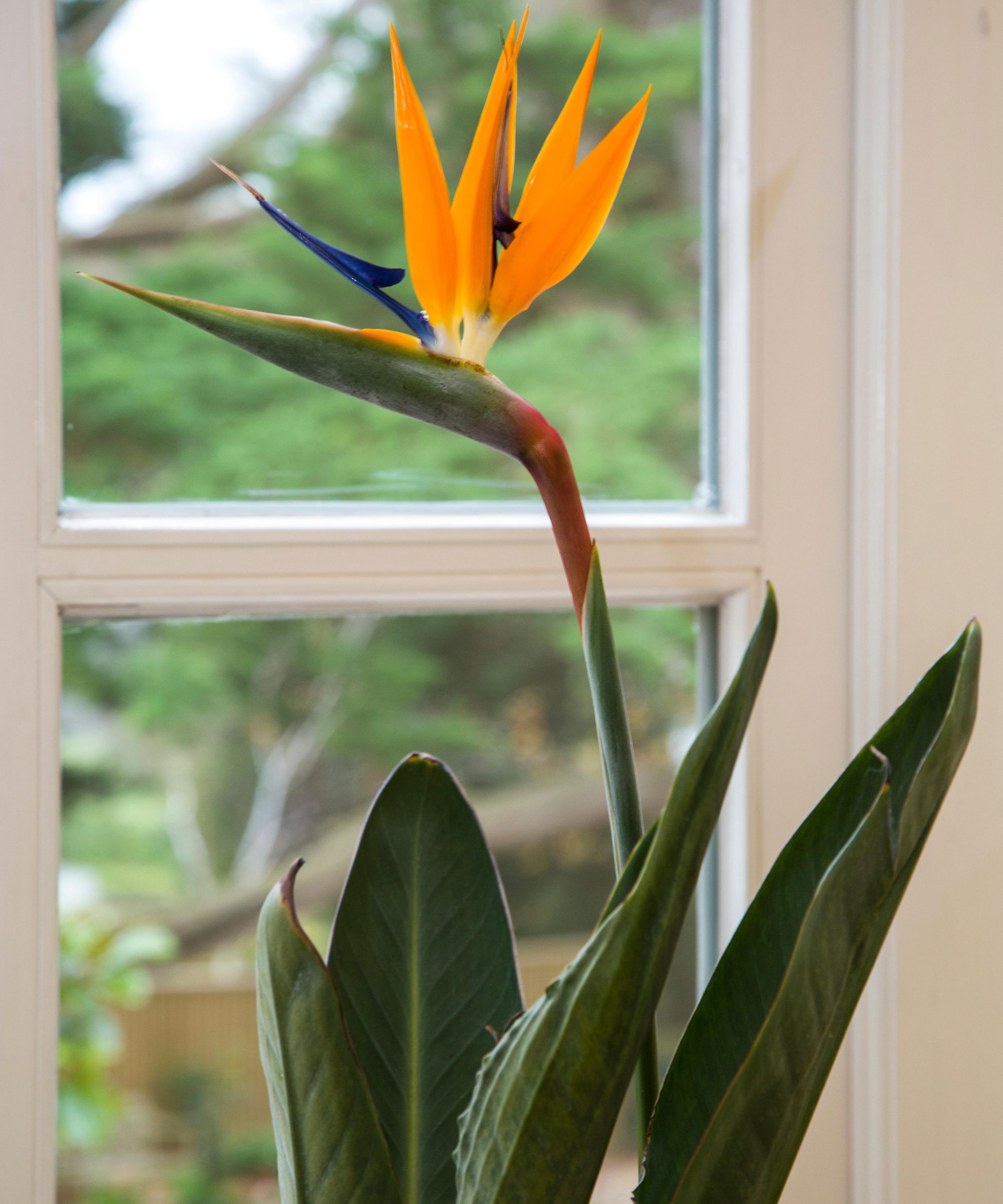
Strelitzia simply can’t be beaten for its tropical looks. Tall and stately with large, ribbed paddle leaves, and if you are lucky those bright and unusual flowers, it epitomizes lush, steamy climes. A South African native, it loves a warm, humid climate with plenty of bright but not direct light.
Growing up to 3-5 ft (1-1.5m) high and 20in-3ft (50cm-1m) wide, it’s an architectural plant that makes a real statement and looks stunning in a living area or kitchen, but it does need space to truly appreciate it’s beauty.
Water and feed regularly during the growing period of spring and summer, gradually reducing the amount of water in fall and winter. Do avoid saturating the soil and letting the roots sit in standing water as this will suffocate the plant. You only need to repot a bird of paradise once every few years – they like to be somewhat pot-bound.
5. Amaryllis
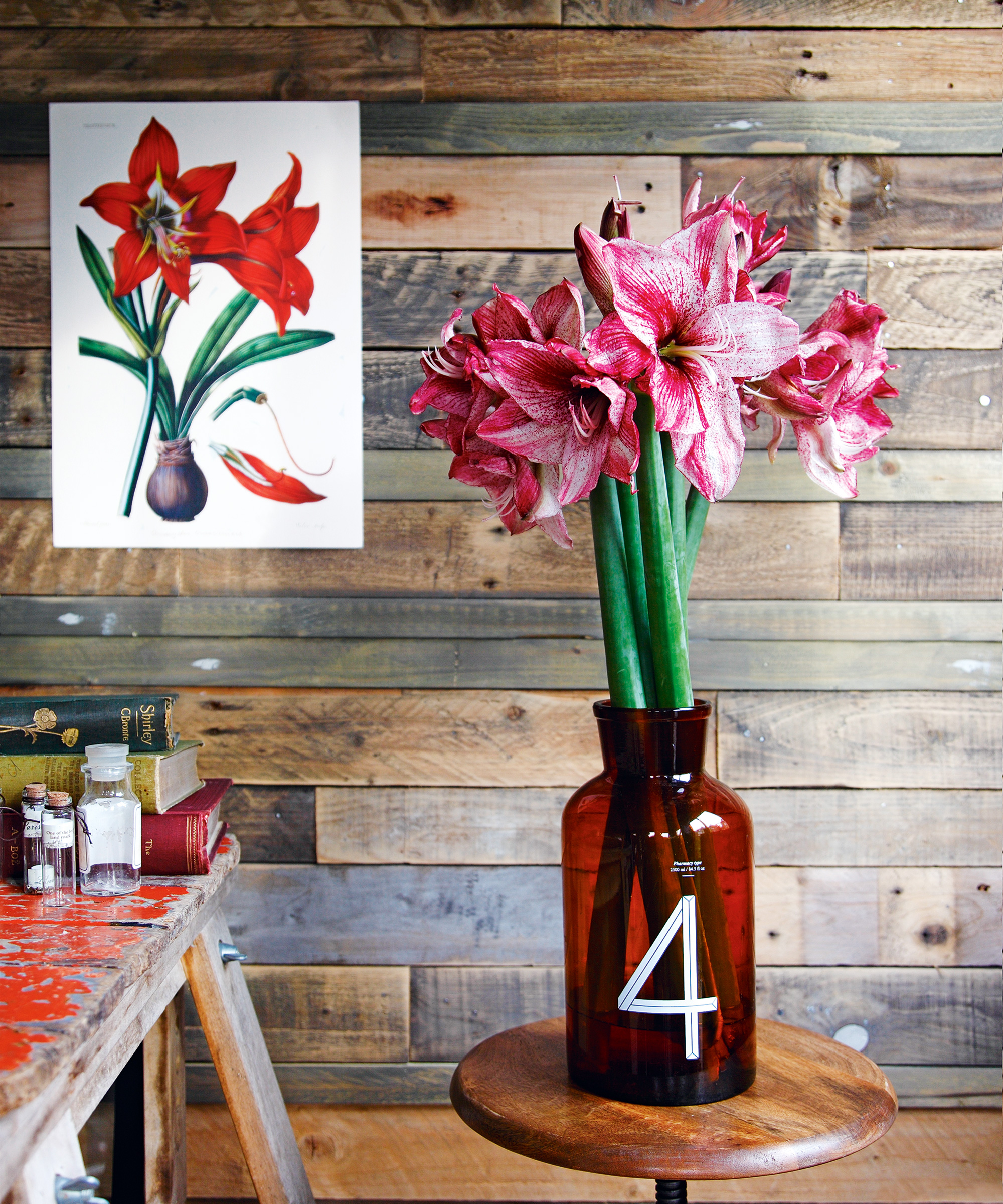
A tropical plant with a difference, this flowering bulb with its giant trumpet blooms oozes exotic and tropical vibes. Often regarded as just for Christmas, amaryllis are hugely satisfying to grow and flower indoors through winter through to early spring.
Plant the bulb in free draining potting compost with the top third of the bulb sitting above the surface. Place the pot in bright, indirect light and water sparingly. Once the shoot is 2 inches (5cm) tall, water regularly, turning the plant to encourage a straight stem. Stake the stem with a bamboo cane or woven lengths of hazel to support the top-heavy flower.
Bulb triallist and grower Sarah Raven says, ‘I love Amaryllis from South Africa and the incredibly fragrant tuberose, both wonderful growing and flowering inside. My favorite amaryllis is probably Green Magic or the very rich crimson Mandela. Tuberose are famously tricky, so they’re a plant I recommend buying already with buds about to burst open. They smell incredible!’
6. Philodendron
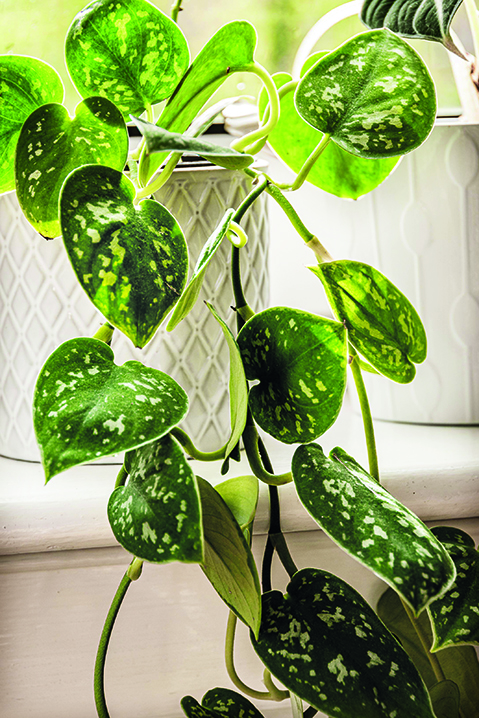
With its mass of large, heart shaped leaves this tropical beauty is a must for an indoor jungle. Choose from upright and climbing varieties and pop them in a bright light position but a bit of shade won’t do any harm.
‘These tropical plants will thrive in almost all levels of humidity, however placing them in high humidity environments will encourage larger leaves,’ says Mark McCance at Hortology. He also suggests to, ‘Increase the bushiness of this plant by pinching out after a leaf node on single stems. This will promote off-shoots and more branches, meaning more leaves.’
With over 489 species to choose from you won’t be left wanting. Preferring a humid environment, you may want to occasionally mist your plant or place it in a steamy bathroom. Temperatures of between 60-75℉ (16 – 24°C) are ideal for this beauty and bear in mind that it can grow up to 13ft (4m) so you may need to trim it as needed.
7. Pothos or Devil’s ivy
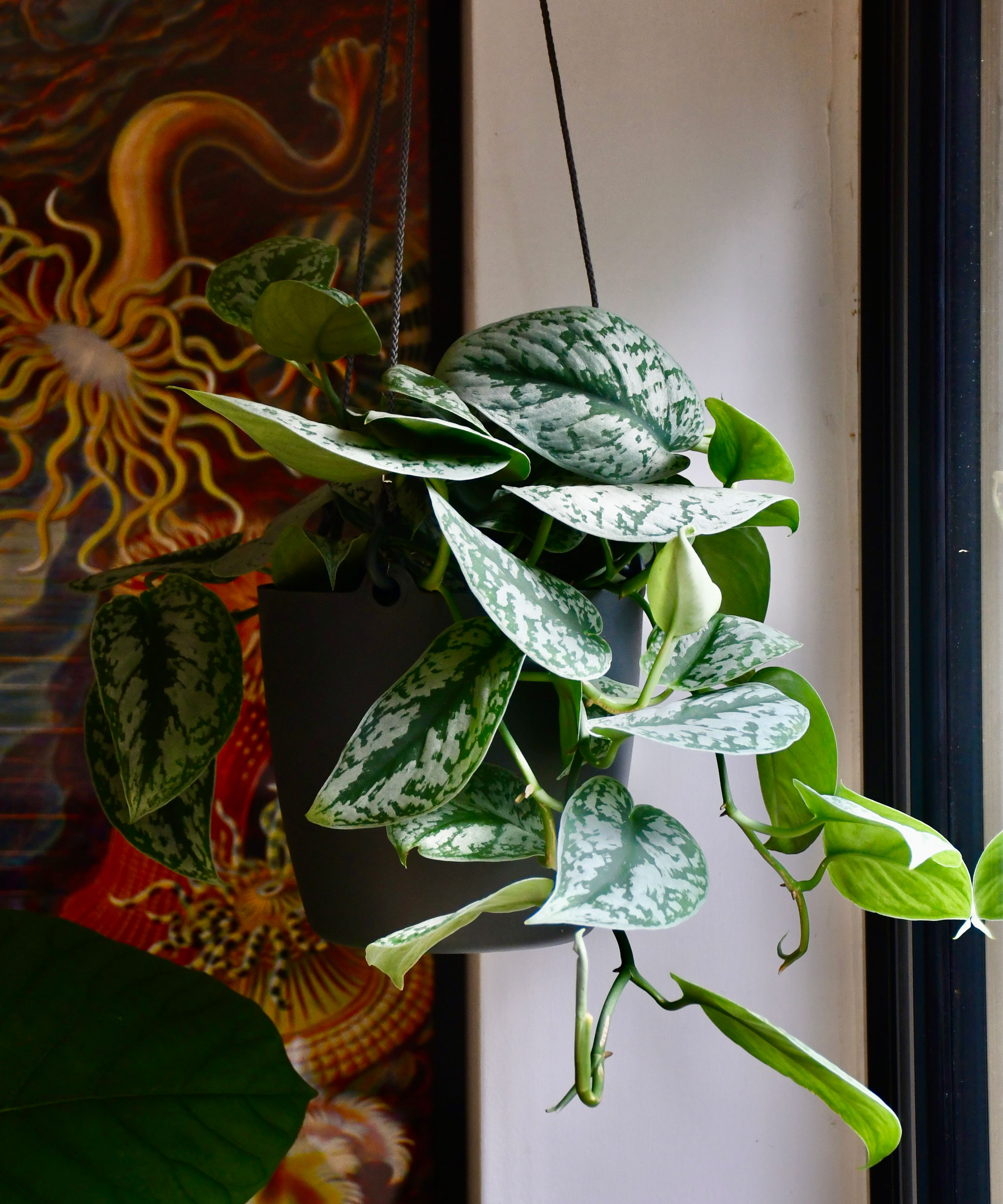
Pothos plant care is easy, and with vines that grow up to 10 feet long indoors, these large leaved climbers (or trailers depending on your preference) are prolific and almost thrive on neglect. With a huge range of different colored foliage to choose from – neon green, silver blue green or leaves with yellow cream specks – you can add real impact to practically any room in the house.
Devil’s Ivy is happiest tumbling from hanging planters – over stairwells or in front of a north facing window – or scrambling up a vertical support such as a moss covered or coco coir pole.
Preferred room temperatures range from 50-73℉ (10 – 24°C) and although they do like humid conditions only water when the top two inches of compost are dry. The leaves tend to curl slightly when thirsty.
8. Majesty Palm
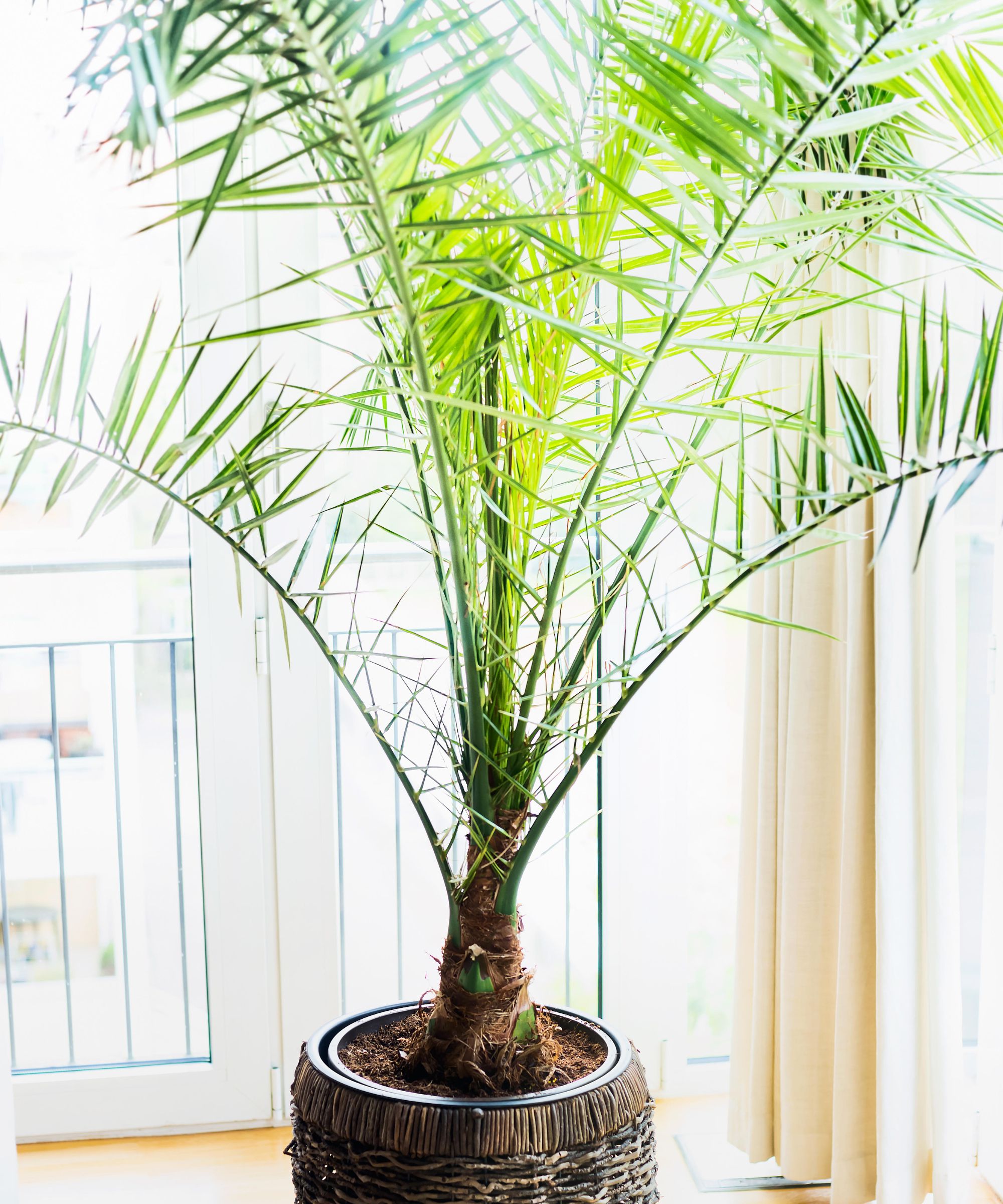
Reaching up to 10 feet high, you can’t beat this elegant palm for instant tropical charm. Thriving in bright but indirect light, this beautiful palm will cast striking shadows on walls and floors and works well solo or as part of a leafy group. Slow growing with large arcing fronds, buy large and this palm will add drama and impact to any room.
Eliza Blank, Founder of The Sill says, ‘Large plants benefit from brighter light to help retain their mature foliage. They also require less frequent waterings due to their higher volume of soil.’
As a rule, water these palms when the top third of the compost is dry to touch. Hailing from western Madagascar they love a humid environment, so do stand them on a gravel filled tray and mist foliage regularly. Avoid positioning them next to a heat source, such as radiators or stoves, as the heat can damage roots and scorch foliage.
9. Alocasia Zebrina
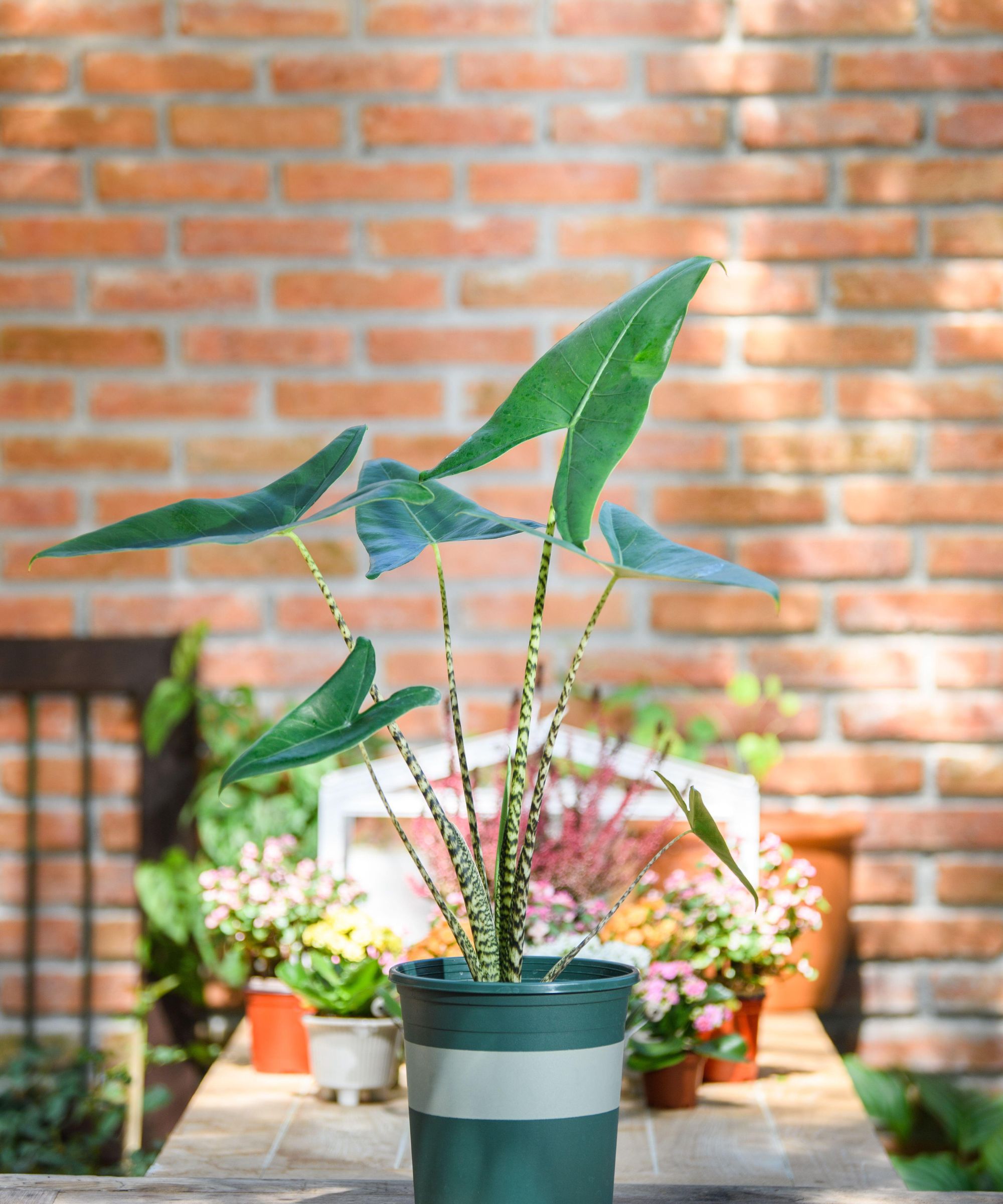
With striking dark green arrow-shaped leaves and a fascinating black and white stem, this standout tropical plant is undeniably eye-catching. Originating from the rainforests of southeast Asia, they were prized for their nutritious, starchy rhizomes but found popularity as a house plant in the 1950s in homes. Reaching a height of (50-100cm) over 2 to 5 years, it’s a great plant for making an impact but without taking up too much space.
Lovers of humid and warm conditions, Alocasia Zebrina thrive particularly well in steamy kitchens and bathrooms. Do not let the room temperature drop to freezing, or below – as this will permanently damage the plant. They also love bright but indirect light, mimicking that of the jungle canopy.
Despite its charming looks, this leafy beauty is toxic to children and pets if ingested.
10. Kentia Palm
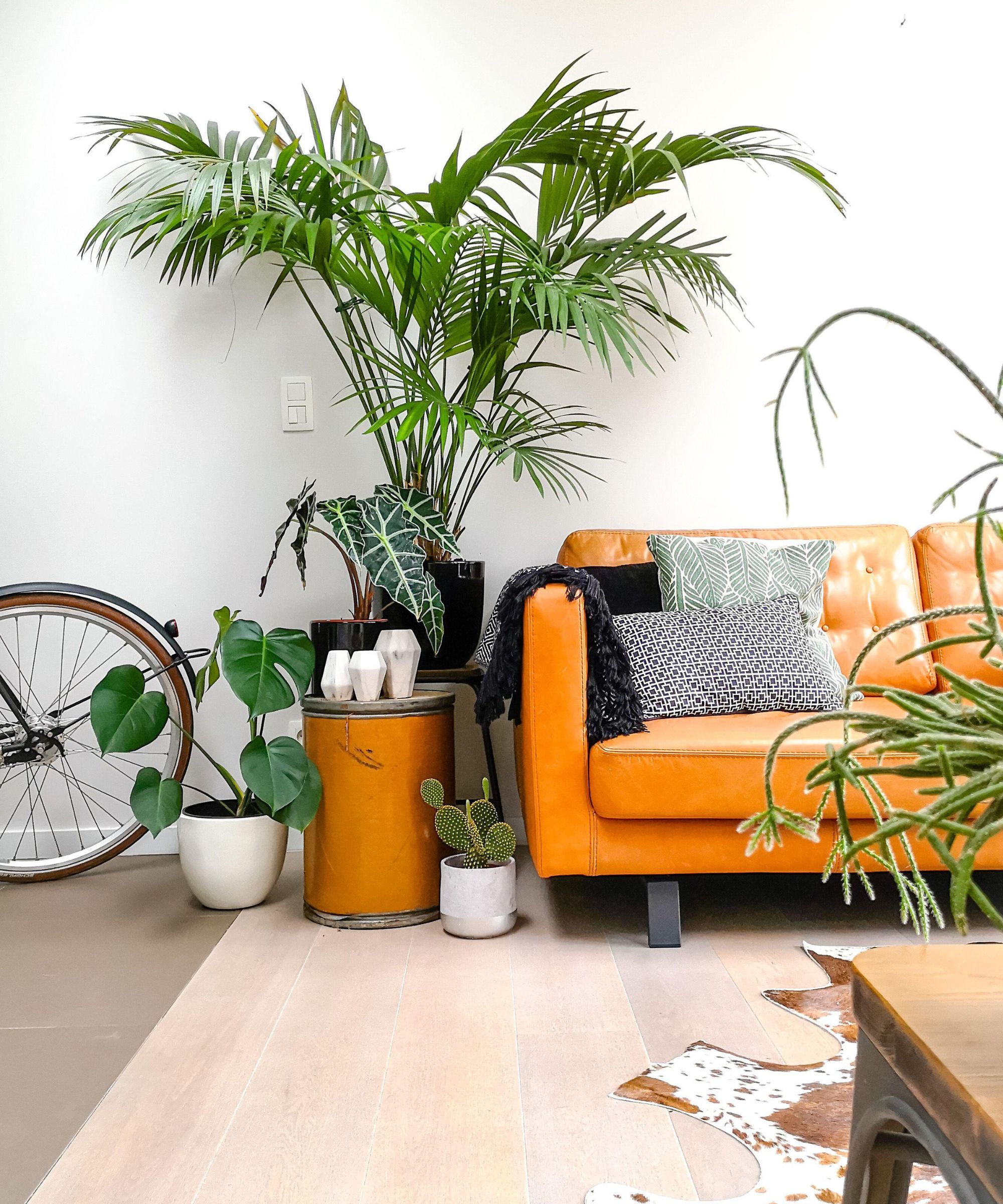
A truly elegant palm that’s pretty undemanding, this graceful beauty will fill any room with tropical charm. They thrive in bright but indirect or dappled shade and are happy as long as the temperature doesn’t dip below 50℉ (10°C).
Indoors they can reach up to 6.5-9.8ft (2-3m) but these plants are slow growers. Mark Lawlor from Happy Houseplants says, ‘Our tip for the Kentia Palm is to go big! They look wonderful when established and well worth the extra cost. Like most houseplants, it will thrive if you treat it a little bit mean. Water sparingly and give it some space to grow and you will be rewarded with a wonderful specimen plant.’
Where to buy tropical plants for indoors
Which house plants are tropical?
Tropical indoor plants are typically those with large glossy or patterned foliage and are grown for their architectural stature or rampant, scrambling nature. Popular choices include: Philodendron; Monstera; Pothos; Kentia Palm; Majesty Palm; Strelitzia.
Do tropical plants do well indoors?
Most popular indoor plants originate from tropical climes. Coming from warm, humid conditions they thrive in most centrally heated homes with the minimum of care.
How often should I mist my tropical plants?
Not sure when and how often to treat your indoor plants to a refreshing spritz? Hank Jenkins of The Plant Provocateur shares this advice: ‘Some plants thrive in humidity. If you don’t give them moisture, their leaves will dry out. If you want new foliage and growth, you need to mist them. Misting is one of the top things that you can do for your houseplants. I advise my clients to mist their houseplants one to two times per week.’

Journalist Jill Morgan has spent over 20 years writing and editing gardening, interior and property features. Titles she has worked on include The English Home, House Beautiful, Ideal Home, Houzz and Modern Gardens and she writes regularly for H&G as a Contributing Editor. Whilst she is a dab hand at renovation projects and DIY, she is happiest when out digging in the garden or planning a new border.